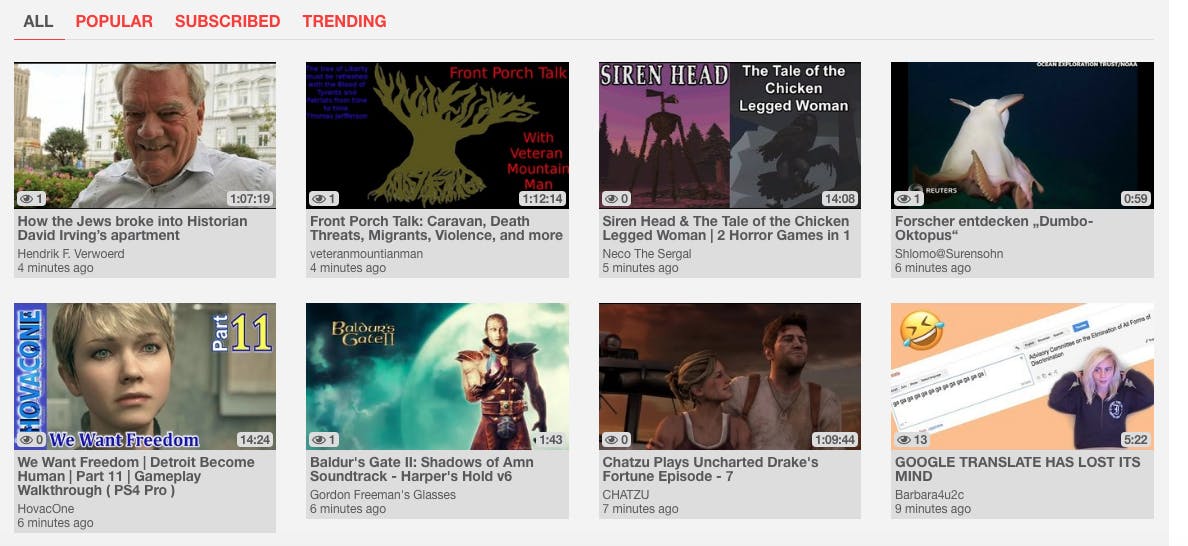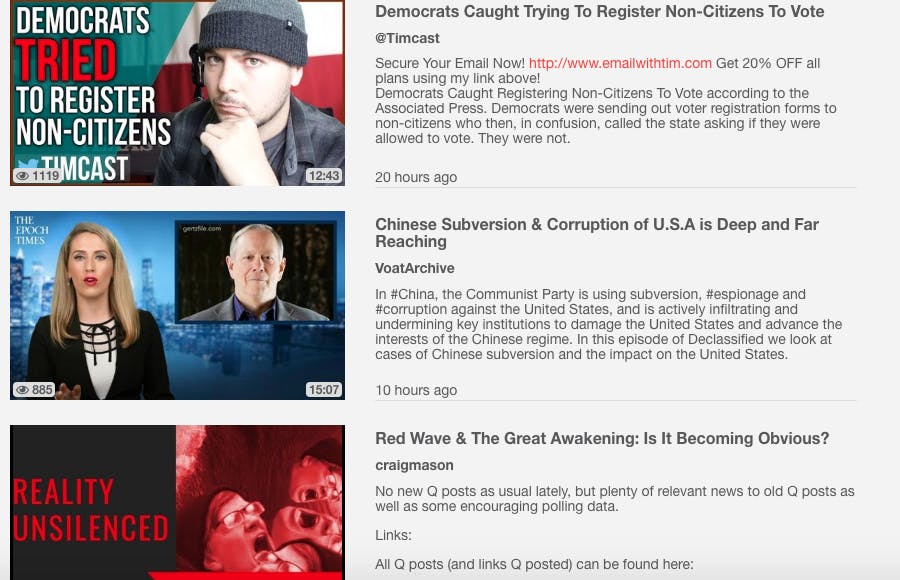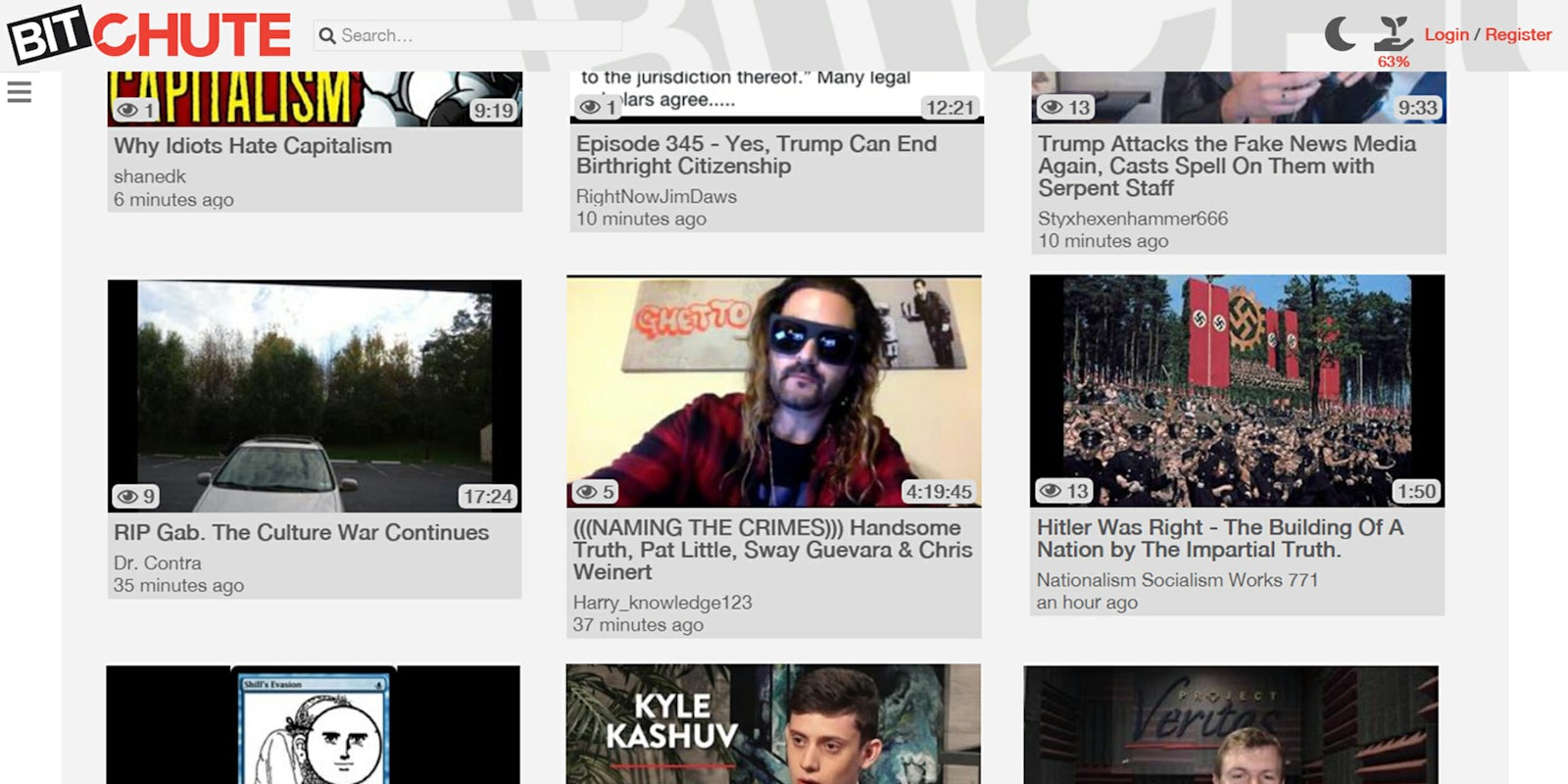On Oct. 27, 48-year-old Robert Bowers walked into a Pittsburgh synagogue and killed 11 people. The videos quickly filed in: The massacre was a false flag, a hoax, a distraction. Here’s the truth about the shooting. This is my theory. The telegraphing continued to theories about Cesar Sayoc, the Florida man accused of sending mail bombs to high-profile Democrats. Full_Metal_Joker had thoughts on the “fake” bombing suspect but gave viewers a warning before diving into them: “Everything I have to say is mostly opinion-based with a lining of truth.”
These reactionary vlogs weren’t on YouTube; they were on BitChute, a peer-to-peer, BitTorrent-powered platform that claims to offer a place for “freedom of expression” and “decentralized distribution.” When YouTube crashed for two hours on Oct. 16, people were feverishly searching Vimeo, Dailymotion, and Pornhub as alternatives. There were jokes on social media about how dependent people were on YouTube, and the outage highlighted just how vast and omnipresent the platform still is. On a different corner, however, people were suggesting BitChute as an anti-censorship, pro-free speech refuge for YouTubers who have become disillusioned with the corporate tech giant, or claim they’re being censored, or, in the case of conspiracy factory InfoWars, have been banned.
Over the last year, YouTube has had to reassess its house. It’s had problems with the spread of white supremacist ideologies, conspiracy theory videos reaching the trending page, fake news being promoted to a larger audience, and white nationalist channels coordinating manipulation of videos. Creators have been accused of profiting off videos about mental health issues and producing harmful kids’ content, and YouTube has been criticized for not being tough enough on popular creators who post offensive material, like the Logan Paul suicide forest catastrophe from January.
In March, the hashtag #YouTubePurge started circulating again, as creators claimed YouTube was censoring them, deleting subscribers, and issuing strikes to accounts for copyright infringement or violating community guidelines. This was around the same time that YouTube CEO Susan Wojcicki said onstage at SXSW that the company would use Wikipedia to combat conspiracy theories, which elicited a chorus of heavy sighs—as if a crowdsourced hive of blog posts were enough of a moral compass here.
Since January 2017, BitChute has fashioned itself as an independent news outlet, but also welcomed the kind of misinformation videos that YouTube has been battling; the partisan, racist, and far-out absurdities that YouTube has tried to smoke out. Just how far can it really stretch its “freedom of expression” mission?
The BitChute flea market
At BitChute—which uses the same black-and-red color scheme in its logo as YouTube, and a fairly similar layout with headers for popular and trending videos—you can find makeup tutorials, wine reviews, DIY toilet repair. There are movie and game reviews, and pop-culture-list sites like WatchMojo, which has more than 19 million subscribers on YouTube, recently jumped over to BitChute. Parts of it feel a little like ’90s shock site Rotten.com. On a recent float through the site, I found a video with a thumbnail of a monkey sucking its own dick. A video titled “[HOT] Teen Sexy Yoga Personal Training Workout” has more than 72,000 views, naturally.
You can also find a video titled “Auschwitz-Why the Gas Chambers are a Myth” and under the hashtag #holohoax, there are several other videos attempting to debunk the Holocaust. You’ll find a channel called Black Crimes Matter, with a tagline that reads: “This channel is dedicated to showing the true nature of blacks. They are biological weapons meant to destroy western civilization.”

Another channel, titled Klan Archives, features archival footage of Ku Klux Klan rallies and speeches, as well as current ones. Wolfclan Armory, a weapons shop in Oregon that is allegedly trying to revive a decades-old white supremacist group, started a channel on BitChute after being kicked off YouTube last year. Its mouthpiece, Jake Laskey, was previously imprisoned for a 2002 attack on a synagogue. The channel is mostly videos of him antagonizing antifa and playing with knives. (He was recently imprisoned again for stabbing Devin Reid Wolfe, a fellow white supremacist.) BitChute hosts videos from Scott Rhodes, an Idaho man with reported ties to white supremacist site Road to Power who was linked to a racist robocall that purported to be Florida gubernatorial candidate Andrew Gillum. Rhodes posted a new video on Oct. 20 discussing the robocalls; the web address theroadtopower.com currently redirects to his BitChute page.
InfoWars is one of BitChute’s high-profile channels; it has more than 28,000 subscribers and InfoWars associates have urged viewers to head over to BitChute. Its most popular videos have more than 10,000 views, though one of the most-viewed videos is of host Alex Jones addressing being censored by other platforms, and censorship is a big deal on BitChute. Many other InfoWars videos, however, have failed to break 1,000 views; including multiple videos that claimed the mail bomber was a hoax.
According to BitChute’s community guidelines, it is not about “oppression or incitement,” or “platform bias.” It also stresses equality for users: “Viewers should decide through objective criteria such as views, likes, and subscriptions which creators are featured most prominently across BitChute, with the expectation that the more widely accepted and supported content will rise to the top.”
That might seem like an ideal business model, especially when creators are fleeing to similar alternative “free speech” platforms like Minds, DTube, and Gab. This week, online payment company Stripe suspended activity with Gab, a far-right answer to Twitter, after it was revealed the Pittsburgh shooting suspect posted there. Stripe terminated its account with BitChute in June, citing pressure from “financial partners,” according to an email posted on BitChute’s forum. (We’ve reached out to Stripe for comment.) As of now, BitChute lists Patreon and PayPal for donations, as well as Ethereum and BitCoin, in lieu of a formal monetization system.
Despite the widely accepted and supported content that often rises to the top, which, according to the popular and trending pages, is heavy on right-leaning politics, BitChute founder Ray Vahey tells the Daily Dot the site welcomes “content from diverse categories and from people of all backgrounds” and adds that it has “become very popular in politics and news, and that is in part because we are one of the few neutral places where independent news can publish and be treated fairly in 2018.” Last month they reportedly saw more than half a million active videos.
You’ll find plenty of reminders of 2018 in this so-called neutral place: videos about Trump (both positive and negative); QAnon, the Trump-centered conspiracy theory that’s floated several failed predictions; social justice warriors; the validity of Me Too. A sampling of recent trending tags offers more context for what’s popular: Trump, InfoWars, gaming, MAGA. Over the summer, Rick and Morty co-creator Dan Harmon left Twitter after a controversial 2009 sketch was recirculated by 4chan and hosted on BitChute. One version of the clip has more than 236,000 views.

In the Cuisine category, one of the month’s trending videos features a thumbnail of a topless woman passed out on a picnic table, with the caption “Christine Blasey (Ford) at a pool party” below it, alongside beer and wine reviews and a vintage cereal commercial. In Music, one trending video from jewtube69 called “Black Lives Will Never Matter” features a character named “Moonman” in front of a Nazi flag. Other song titles make liberal use of the N-word. Vahey says they remove “any videos that are found to violate our terms and community guidelines,” and that includes “pornography, pirated movies, doxing, illegal material such as terrorist content or content that incites violence.”
Vahey, who is from the U.K., previously worked as a software engineer. He’s also an animator, having created kids’ webseries on the YouTube channel Little Rockstar. He says the idea for BitChute was born in 2016, “when I noticed many content creators I followed were reporting increased levels of censorship and demonetization.”
“YouTube has changed a great deal in recent years by becoming incrementally more corporate and boring,” he says. “They are now more likely to recommend videos from CNN or a Saturday night TV host than the types independent creators who helped to build that platform, and we’re stepping into that gap.”
BitChute’s own rock star
Styxhexenhammer666, one of BitChute’s more popular creators, has more than 30,000 subscribers. He often wears a leather jacket, often with no shirt, and mostly speaks on topical political news and the dangers of “big tech.” He publishes books under the name Tarl Warwick, with an emphasis on occult and spiritualism, having written on ASMR, gun control, psychotropics, extraterrestrials, and “Transforming Negativity into Ambition.” Earlier this year he announced his write-in candidacy for the Vermont governor’s race. That bid has ended, however.
He tells the Daily Dot that his use of fundraising platform Patreon might have been scrutinized in terms of campaign contributions he received—“and it’d surely be a debate issue if I was onstage with a bunch of corporatists.”

He says the YouTube purge was actually helpful in building his audience, and it certainly includes those with far-right views who might have been censored themselves. He claims his audience “tends towards libertarianism and civic nationalism,” though some are still there for the occult stuff, and he’s appeared on shows that trade in white nationalist ideologies, like YouTube channel Red Ice. Warwick’s YouTube channel has more than 300,000 subscribers, and his earlier videos, circa 2013 or 2014, are more focused on occult and religion.

While he still posts to both YouTube and BitChute, he says his views haven’t changed from those earlier videos to now—rather, “with the change in era came a change in what was important to talk about.” Recent videos on important topics include “The Mail Bomber is Almost Certainly a Liberal who Listens to Legacy Media Fearmongers” and “Gab Gets Infowars’d by the Corporate Authoritarians, to Great Applause by Thoughtslaves.”
“I feel censored on YouTube, yes, but not as much as some people,” he says, “and although I still enjoy YouTube, it’s just a general feeling that the platform has begun to move in a very negative direction, away from independent users and free thought and towards increased site policing and more corporate brands that we all started using YouTube to get away from in the first place.”
READ MORE:
- The most-viewed YouTube videos of all time
- The 25 most-subscribed-to YouTube channels
- How to block YouTube channels and videos
A few recent studies have shown that right-leaning viewers have been further radicalized by YouTube and that the platform has made it easy for hate speech to reach a larger number of viewers. Back in March, techno-sociologist Zeynep Tufekci wrote about YouTube’s radical-right reach, and the sinkhole that is its algorithm: “What we are witnessing is the computational exploitation of a natural human desire: to look ‘behind the curtain,’ to dig deeper into something that engages us. As we click and click, we are carried along by the exciting sensation of uncovering more secrets and deeper truths. YouTube leads viewers down a rabbit hole of extremism, while Google racks up the ad sales.”
On BitChute, there isn’t the same push into iffy related content that YouTube’s struggled with (and made money off), and there are no ads. Many creators on BitChute have a brand or image they’re pushing, personalities they’ve shaped over years on YouTube, and an audience that might follow them to a new platform. But smaller creators are still trying to figure out how to build fanbases.
Hashtags and free speech
Vanessa Berben, who runs the channel 2FingersBerben, still posts to YouTube to discuss and advocate for mental health. But her BitChute posts are largely about her support for the conservative #WalkAway movement, which advocates for disillusioned liberals to join the right. (Berben has disclosed that she volunteers for the #WalkAway campaign.) The movement gained some momentum over the summer, but it also had some plot holes, like the Twitter bot accounts and royalty-free stock photos used to promote it. Alex Jones made a donation to the campaign’s GoFundMe over the summer, and #WalkAway mouthpiece Brandon Straka appeared on InfoWars in September. Straka was suspended from Facebook that same month for posting a link to the InfoWars interview.
Berben has a little over 20 subscribers and tells the Daily Dot she “definitely joined BitChute out of a love for free speech but I’m struggling to find an audience there in the same way I’ve found one on YouTube. From what I’ve heard from other users, they’re trying to switch over for the same reasons and many are having the same issues.” She joined the #WalkAway movement in July “after having enough with growing intolerance for differing opinions and the violence coming from the far-left and far-right.”
More recently, Berben advocated for the #TrumpChallenge, urging viewers to disengage from mainstream media for the week leading up to the midterms to avoid fake news about Trump. Berben’s a former entertainment journalist who’s written for HuffPo, but she says she’s “no longer professionally tied to anyone and that gives me a freedom to speak my mind that sadly many Americans don’t have.”

Asked if she considers herself a Trump supporter now, and if she thinks his actions and ideologies are good for mental health, she replies: “It’s a shame if someone feels that way, anyone who believes another person is responsible for their own mental health does themselves a disservice. I don’t consider myself a Trump ‘supporter’ per se because he says things sometimes that makes me cringe. He currently has my vote because I feel the Democratic Party holds some harmful positions, such as their stance on immigration.”
We’ve reached out to YouTube to see if it has any thoughts on this alternative video platform. But Vahey sees BitChute as competition, and a way to push back against bigger, more powerful social media companies.

“I’ve long believed that people should have a right to think freely and discuss subjects such as the daily news and this right shouldn’t only belong to large corporations,” he says. “The Internet, along with social media, has played an important role in ensuring this fundamental human right and it would be a great shame to lose it. In fact, I believe it would cause serious damage to society at large as freedom of expression is the way we resolve our societal problems and keep the people who govern us in check.”
But if we look back at the Pittsburgh shooting, or the Florida mail bomber, or even the 2017 white nationalist march in Charlottesville, Virginia, that ended in a woman’s death, it’s clear freedom of expression often means freedom to espouse racist, hateful views. On sites like BitChute, Twitter, YouTube, and Gab, that often happens without consequence. BitChute wants to be a rogue ship in the video ecosystem that rails against censorship, but when violent, extremist, white supremacist content is still flourishing and reaching an audience on YouTube, is it really an alternative? And as its user base grows, will BitChute just end up facing the same issues YouTube is still figuring out?


